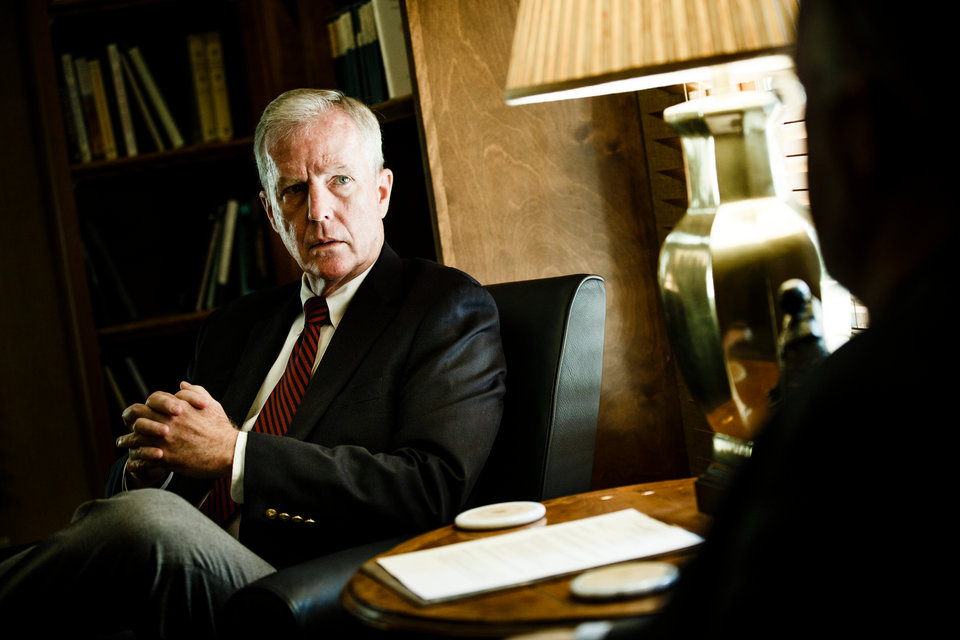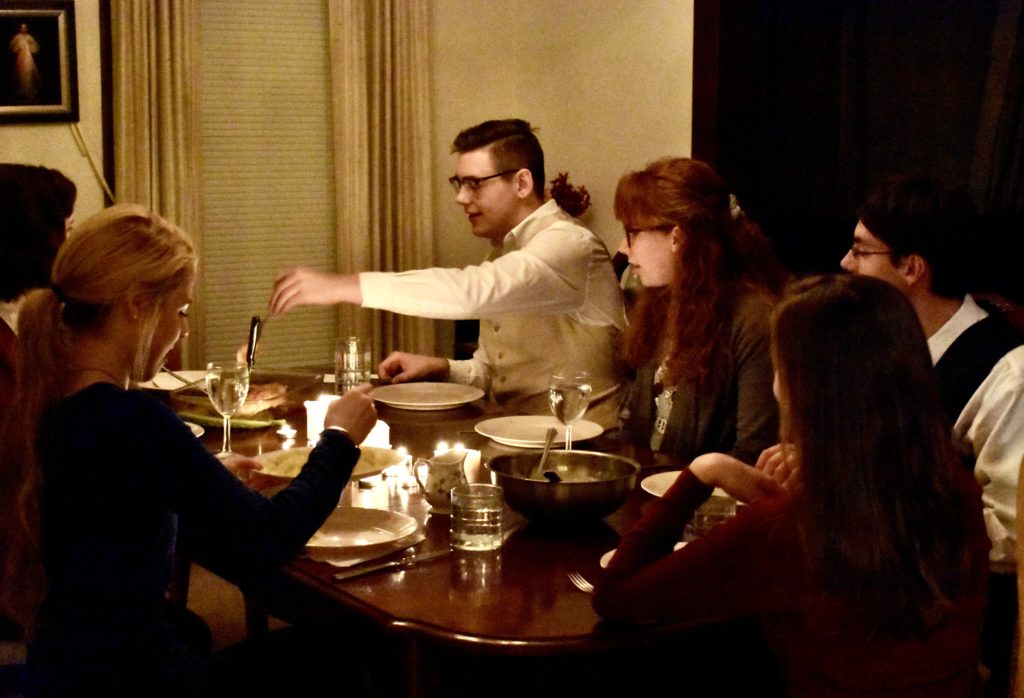The Center for Catholic Studies mourns the passing of its founder, Dr. Don J. Briel, who passed from this life on Feb. 15, 2018, at the age of 71 after a diagnosis of two forms of acute leukemia in mid-January. He is survived by his five children and six grandchildren.
Briel was born auspiciously on the feast of St. Thomas Aquinas, Jan. 28, 1947, in California. In 1965 he entered the University of Notre Dame where he studied with legendary “bachelor don” Frank O’Malley. After graduation he studied literature at Trinity University in Dublin, Ireland, before going on to earn a licentiate and then a doctorate in Catholic theology at the University of Strasbourg in France with a dissertation on John Henry Newman and fellow Oxford Movement member Isaac Williams. After short teaching stints at the University of San Francisco and St. Mary’s University in Kansas, Briel began teaching at St. Thomas in 1981. In 1990 he was appointed the first lay chair of the Theology Department, a position he filled until 1999.
During his time in the Theology Department Briel saw the need for a more coherent and unified approach to education within the Catholic university. After experimenting with some programs – such as Perspectives, which combined readings in philosophy, literature and theology – Briel and other colleagues discerned the need for something different that would allow a new kind of interdisciplinary study that would respond to the highly specialized modern university. Inspired by Newman’s Idea of a University, Christopher Dawson’s educational focus on two millennia of Catholic culture and O’Malley’s own humanistic teaching, he proposed a program that would allow both faculty and students to set up the conditions for an integrated Catholic approach to education. That program was Catholic Studies.
The program grew as Briel realized it would need formation programs to facilitate a student and faculty learning community of persons marked by joy in the truth. It would also need new institutional arrangements that could provide resources for faculty to pursue interdisciplinary formation and projects. Thus, the Department of Catholic Studies and the Rome program were developed for students. For faculty, the Center for Catholic Studies with its three institutes and the journal LOGOS were created.
Briel’s strong leadership continued at St. Thomas until his 2014 retirement – and his advice and mentoring for many at St. Thomas continued until his death. After Briel’s retirement, the University of Mary in Bismarck, North Dakota, which had been developing a Catholic studies program and thinking about their entire university curriculum with his assistance, held a conference in his honor. Dr. Matt Gerlach ’97, a former student and faculty member in Catholic Studies, edited and published the lectures from the conference in a book titled Renewal of Catholic Higher Education: Essays on Catholic Studies in Honor of Don Briel (see next page). Briel was then named the Blessed John Henry Newman Chair in Liberal Arts at the University of Mary. There he not only mentored faculty, advised the board and taught occasionally, but also helped develop a University of Mary Catholic Studies program at Arizona State University.
Indeed, it was his clear-sighted vision of the needs in the broader world of higher education that marked his genius. Briel saw that the vast majority (90 percent) of Catholic students were not attending Catholic institutions of higher education. While in the past it might have been possible to have simply a chaplaincy or Newman Center on campuses to provide the sacraments and some religious formation, today’s students need a form of integrated academic and spiritual formation on campus. His mentoring and advice were instrumental in creating some of the best Catholic formation programs on secular campuses, such as the Newman Institute for Catholic Thought and Culture at the University of Nebraska.
There was a true sacrifice in Briel’s path. David Delio, S.E. Canizaro Professor of Theology at Holy Cross University, who worked with Briel on several initiatives in the last year, observed that Briel had a first-rate mind, and he could have produced much more in the way of traditional scholarship that is rewarded by the contemporary university.
Although Briel wrote some important pieces, particularly explaining the origin and thought behind Catholic studies, he put his energy into making Newman’s idea of a university a living thing at St. Thomas and gathering networks of scholars who could respond to the needs of higher education in their own places. Delio observed, “There are few Catholic initiatives of any interest in this country that don’t have Don’s fingerprints on them.”
He not only mentored others around the country, but dedicated a great deal of his time to teaching and advising students. His first-floor office in Sitzmann Hall was a kind of Grand Central Station for students looking for support and direction. And while not an exciting lecturer, he was a captivating one. He had the capacity to explain difficult concepts in direct and plain English, the respect to treat students as capable adults and the compassion to gently reveal his displeasure at their failure to engage the truth in depth. Some students called him James Bond for his cool demeanor and international travel, but he was seen more often as a wise intellectual and spiritual father. Briel could and did say “no” quite often, but when he approved a project, he didn’t micromanage. His idea from the first was that different Catholic minds coming together would, under providence, work out details. Catholic studies, he said, was God’s work, not his.
In the weeks after his January prognosis and before his death, Briel was cared for by the Handmaid Sisters, an order founded by St. Thomas Catholic Studies alumna Mother Mary Clare Roufs ’01 with Briel’s encouragement. Somewhat astonished to find himself more active in those short weeks than he had been in the years before, his Minneapolis house became a kind of pilgrimage site for colleagues, friends and former students who came to tell him what Catholic Studies, his mentorship and his fidelity to Christ and the Catholic Church had meant to them. Many wanted one final bit of wisdom from him. After he was no longer taking visitors, Dianne Johnson ’98, ’06 CSMA, a nurse who has been very active in Curatio, an organization designed to spiritually and intellectually support Catholic health care professionals, wrote to me. “God willing, if he rallies a bit and can take visitors again, I would love to thank him in person for all he has done for me. Perhaps that is selfish on my behalf but seriously he has had a huge impact on my thinking and gave me the courage to keep going with Curatio. What a gift he has given us! I don’t think folks understand how incredible one feels knowing and connecting the truth everywhere one looks. Catholic studies does that.”
Briel’s death was as auspicious as his birth. Surrounded by his children and some close friends, Briel died on the Thursday after Ash Wednesday, the day on which Roman pilgrims celebrated the station Church of San Giorgio in Velabro, the titular church of Briel’s beloved Cardinal Newman.
Requiescat in pace.





